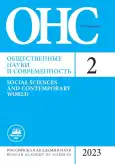The role of J. Basanavičius in the making of lithuanian nationalism
- Autores: Kilimnik E.V.1
-
Afiliações:
- Ural Law Institute of the Ministry of Internal Affairs of the Russian Federation
- Edição: Nº 2 (2023)
- Páginas: 39-55
- Seção: Articles
- URL: https://journals.eco-vector.com/0869-0499/article/view/675198
- DOI: https://doi.org/10.31857/S086904992302003X
- EDN: https://elibrary.ru/CEDFWV
- ID: 675198
Citar
Texto integral
Resumo
Based on the cultural-philosophical approach, the shaping of the ideology of Lithuanian nationalism in the second half of the 19th - early 20th centuries are examined. The theoretical and methodological foundation of the study consists of the analysis of journalistic and social activities of the “father of the Lithuanian people” Jonas Basanavičius. The task is set to identify the main ethnic inconsistencies and cultural and historical contradictions in the ideological concept of the origin of the Lithuanian language and Lithuanian national self-identification theory created by J. Basanavičius. It is revealed that in his ideological and nationalist works J. Basanavičius artificially formed the Lithuanian national identity, which does not have documentary and historical confirmation. The purpose of J. Basanavičius’ work was to counteract Russian national policy, as well as to create an independent state entity - Lithuania.
Palavras-chave
Sobre autores
Evgeniy Kilimnik
Ural Law Institute of the Ministry of Internal Affairs of the Russian Federation
Email: kilimnik_06@mail.ru
Yekaterinburg, Russia
Bibliografia
- История Литовской ССР: с древнейших времен до наших дней (1978) Ред.: Б. Вайткявичюс и др. Вильнюс: Мокслас. 676 с.
- Капеллер А. (2000) Россия - многонациональная империя. Возникновение, история, распад. М.: Прогресс- Традиция. 344 С.
- Миллер А.И. (2008) Империя Романовых и национализм: эссе по методологии исторического исследования. М.: Новое литературное обозрение. 246 с.
- Поцюс М. (2009) Обратная сторона луны: борьба литовских партизан против сотрудничества в 1944-1953 гг. Вильнюс: Издательство ЛИИ. 426 с.
- Савельева И. М., Полетаев А. В. (2006) Национальная история и национализм // Вестник Российского университета дружбы народов. Серия "История России". № 2. С. 18-30.
- Эйдинтас А. и др (2013) История Литвы. Vilnius: Eugrimas. 318 с.
- Anderson B. (1991) Imagined Communities. Reflections On the Origin and Spread of Nationalism. London: Verso. 224 p.
- Baronas D. (2010) Pilėnaiir Margiris: istorija ir legenda. Vilnius: Vilniaus dailes akademijos leidykla. 633 p.
- Basanavičius J. (1883a) Оsenowės Lietuwos piles // Auszra. No. 1. Рp. 15-18.
- Basanavičius J. (1883b) Оsenowės Lietuwos piles // Auszra. No. 3. Рp. 60-64.
- Basanavičius J. (1883c) Оsenowės Lietuwos piles // Auszra. No. 4. Рp. 97-102.
- Beresnevičius G. (2004) Lietuvių Religija ir mitologija: sisteminė studija. Vilnius: Tyto alba. 291 p.
- Conversi D. (2002) Conceptualizing Nationalism: An Introduction to Walker Connors Work. London: Routledge. 23 p.
- Gailienė D. (2018) Why Are Suicides So Widespread in Catholic Lithuania? // Religions. No. 9. 71 p.
- Hopf T. (2002) Social Construction of International Politics: Identities and Foreign Policies, Moscow, 1955 and 1999. Ithaca: Cornell University Press. 299 p.
- Lietuvių tautininkų sąjunga (1934) Kaunas: Vilties. 64 p.
- Puzinas J. (1977) Dr. Jonas Basanavicius- Founder of AUSRA // Lituanus. Vol. 23. No. 3.
- Strods H. (1996) Latvijas nacionalo partizanu kars, 1944-1956. Riga: Preses Latviešu val. 573 р.
- Zinkevičius Z. (1987) Lietuvių kalbos istorija. Vilnius: Mokslas. 189 р.
Arquivos suplementares










